Young Americans—from both political parties—want to save you from climate change
It was one of the largest youth-led protests since the Vietnam War, as hundreds of thousands of Americans took to the capital to protest gun violence. But it wasn’t the size or scale of the March for Our Lives that made it remarkable. As Robinson Meyer of The Atlantic wrote, it was that “adults paid attention to the everyday lives and traumas of young people—not out of fear, anxiety or frustration—but out of respect.”
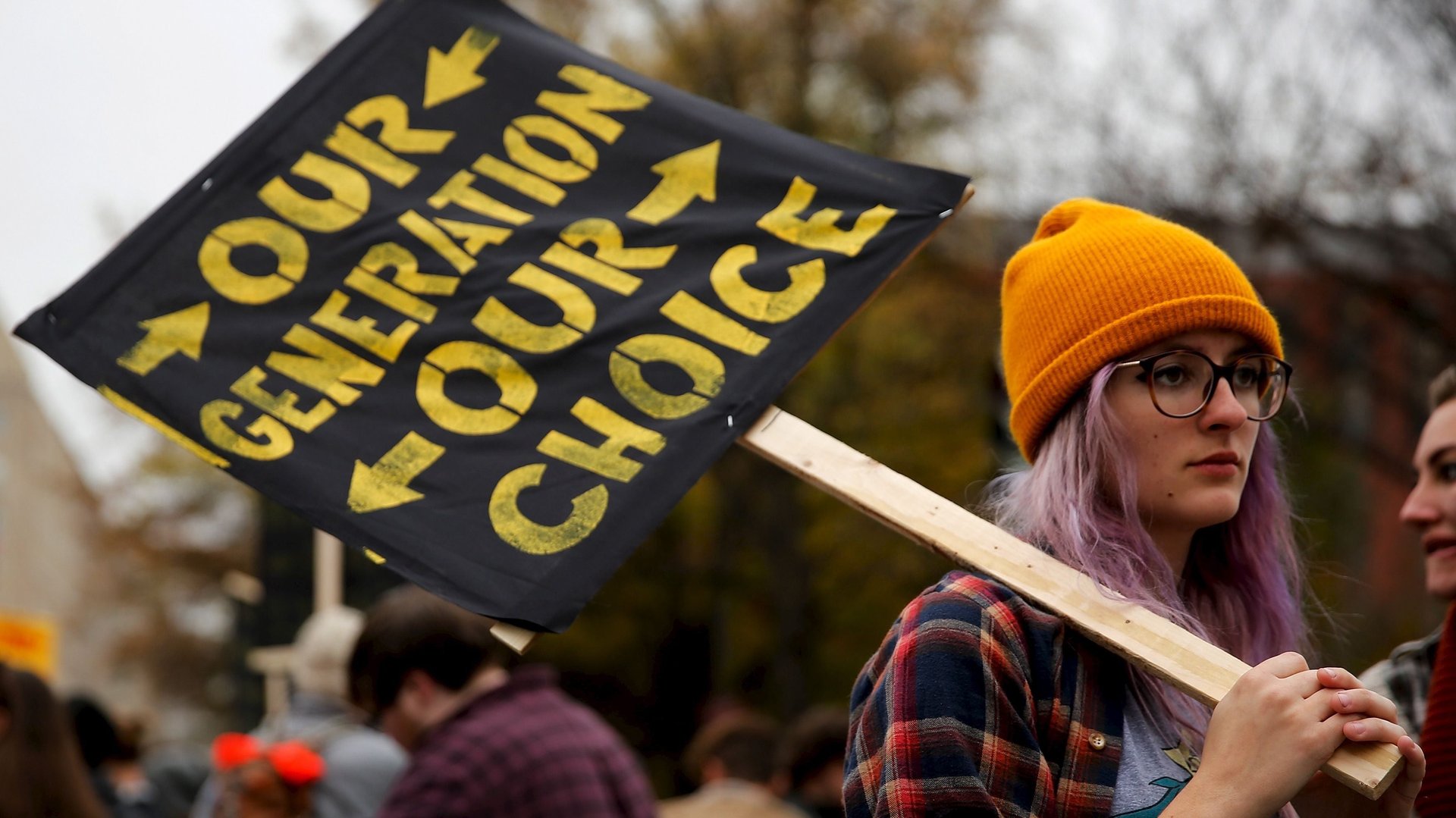

It was one of the largest youth-led protests since the Vietnam War, as hundreds of thousands of Americans took to the capital to protest gun violence. But it wasn’t the size or scale of the March for Our Lives that made it remarkable. As Robinson Meyer of The Atlantic wrote, it was that “adults paid attention to the everyday lives and traumas of young people—not out of fear, anxiety or frustration—but out of respect.”
Youth organizers from Parkland, Florida made gun violence into a personal issue, and in so doing, they mobilized millions. Now, their peers in high schools and colleges across the United States are vying to do the same for climate change.
“Seeing it from that perspective, it isn’t a partisan issue. These children are fearing for their lives, and they just want change. That’s what we want to do with our movement,” said Zanagee Artis, a high school senior from Clinton, Connecticut and founding member of Zero Hour, a youth-led climate advocacy group. “Some people might not believe in climate change, but we’re asking them to believe in us. We want change as well.”
Staring down the barrel of a hotter, drier, more turbulent world, the next generation of American leaders is eager to find a solution to climate change, and they are agitating for progress in the courts and on the streets. Their passion is a testament to the fact that, sooner or later, we are destined to end our love affair with fossil fuels.
Young Americans—both Democrats and Republicans—want a solution to climate change.
Around nine in 10 millennials understand that the climate is changing, the highest proportion of any age group, while nearly eight in 10 think humankind must work to stem the rise in temperature. That includes a majority of Republicans. Most young Republicans recognize that humans are altering the climate and want the government to tackle the problem. According to one poll, Republican millennials trust the Democratic Party more than the GOP when it comes climate change, which should alarm party leadership. It is notable that young Republicans are willing to break from conservative elites on this issue, and it speaks to the fact that climate change has more salience for young Americans than it does for their parents or grandparents.
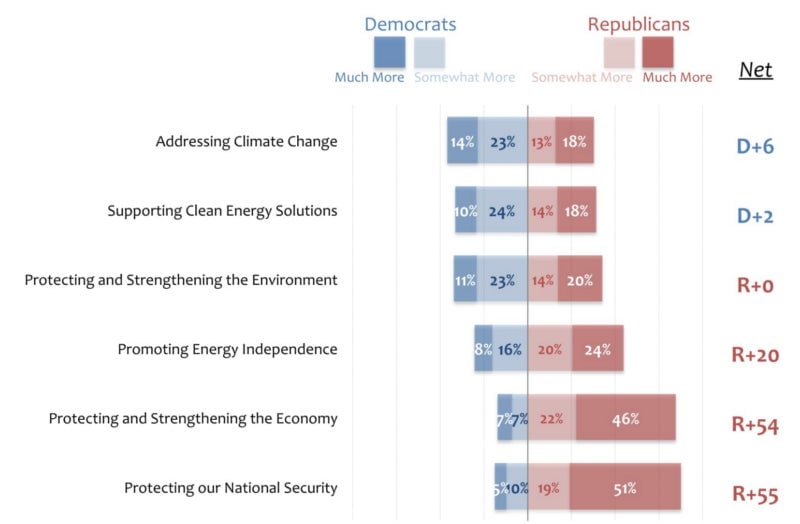
“Millennials may be more likely to accept that climate change is occurring because they’re part of a generation hearing and learning about it in school. There have also been increasing extreme weather events happening around the country and globally in recent years—floods, droughts and hurricanes—that have been making headlines,” said Sheril Kirshenbaum, former director of the University of Texas Energy Poll. “And of course, we have more and more data from scientists themselves documenting what’s taking place. In polling, we cannot say what exactly influences changing public attitudes, but I suspect it’s a combination of many of these.”
Young Americans don’t like fossil fuels, and that’s bad news for the industry.
Young Americans are deeply skeptical of the oil and gas industry, teenagers in particular, according to a recent survey. Around half of Americans aged 16 to 18 believe the oil and gas industry doesn’t want what’s best for them. Most say that wind and solar are the fuel of their generation, while oil and gas are the fuel of their parents’ generation, and coal is the fuel of their grandparents’ generation.
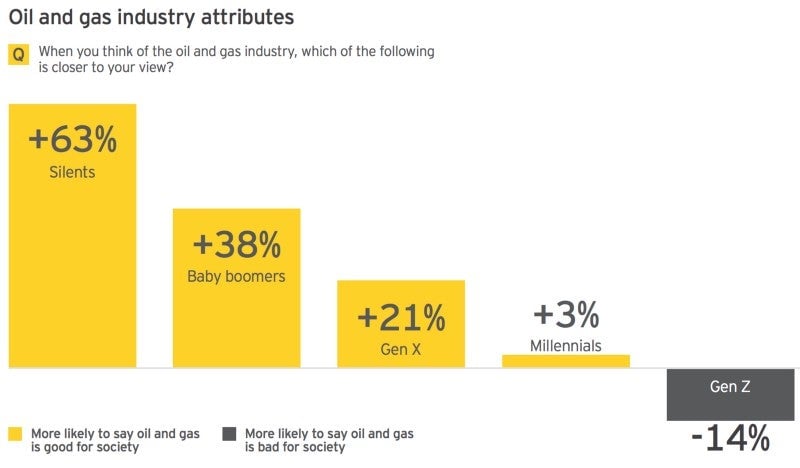
That survey also found that just one in four Americans aged 16 to 19 find careers in the oil and gas industry appealing. Few believe that jobs in the oil and gas sector will confer prestige, provide long-term financial stability, or allow workers to have a positive impact on the world—and this has executives worried.
At last year’s UN climate talks, youth organizers interrupted a controversial panel promoting the use of fossil fuels to sing a protest song. As the assembled twenty-somethings marched out of the room, chanting and clapping, representatives from the energy sector were left to mull over the scene. Barry Worthington, executive director of the United States Energy Association, remarked on what it meant for an industry struggling to recruit young talent.
“We’re replacing 65-year-olds with 25-year-olds. The 25-year-olds—some of whom were just here—have a very different view on climate change than the 65-year-olds, and they want us to reduce emissions,” Worthington said. “And all these kids… want to work for a company that’s green, clean and cool. And if that isn’t us, they’re going to go work for someone else. And that somebody else wants to steal our business.”
Young Americans are marching over climate change.
Zanagee Artis and his colleagues at Zero Hour are raising money to organize a march in Washington, DC on July 21. Like their counterparts working against against gun violence, their group sprung up almost overnight, formed after a chance encounter at a summer program at Princeton University last year. That’s where Artis met Jamie Margolin, a high-school sophomore from Seattle, Washington and head of Zero Hour.
In the months that followed that first meeting, Margolin, Artis and their peers recruited students from across the country to join their group, meeting by video conference after school and during lunch breaks to lay out their strategy. At the July march, they will call on lawmakers to move the United States to nearly 100% renewable energy by 2028, and urge politicians to decline donations from groups associated with the fossil fuel industry.
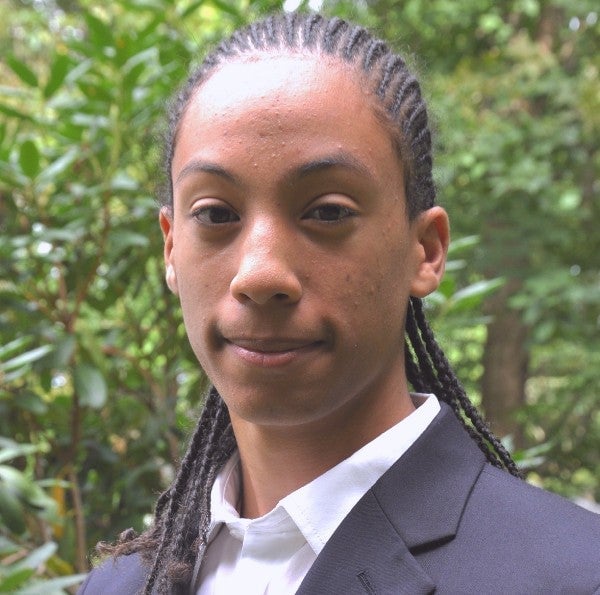
“We really want to focus on finding youth from front-line communities who want to speak out and tell their stories,” Artis said. “We don’t want to make it about partisanship, but rather an issue that is going to affect everyone.”
Other youth activists have taken a similar tack, mobilizing young Americans, for whom climate change is a personal issue, to put pressure on lawmakers and lobbyists. The Sunrise Movement, a pioneering youth-led climate advocacy group, for example, has held sit-ins on Capitol Hill, interrupted meetings of oil lobbyists, and planted time capsules noting which elected officials have pledged to uphold the Paris Agreement and which have not.
“We are building a movement across the country and are ready to kick out politicians who put fossil fuel lobbyists above our futures, no matter their political party,” said William Lawrence, a volunteer with Sunrise Michigan. Sunrise Movement is currently training hundreds of volunteers across the country to rally voters in the 2018 midterm elections.
Young Americans are suing over climate change.
Perhaps the most notable example of youth activism is the 21 young Americans who are suing against the federal government for doing too little to stop climate change. The Trump administration has tried to block the case, but, so far, it has been unsuccessful. Experts say the case has a strong legal grounding. Like the plaintiffs in cases such as Brown vs Board of Education and Roe vs Wade, the children behind this lawsuit claim that lawmakers have infringed on their constitutional rights.
“This intergenerational injustice violates the rights of young people and future generations to life, liberty and the pursuit of happiness and property, without due process of law,” said Sophie Kivlehan, one of the plaintiffs. “The courts must step in to help us.”
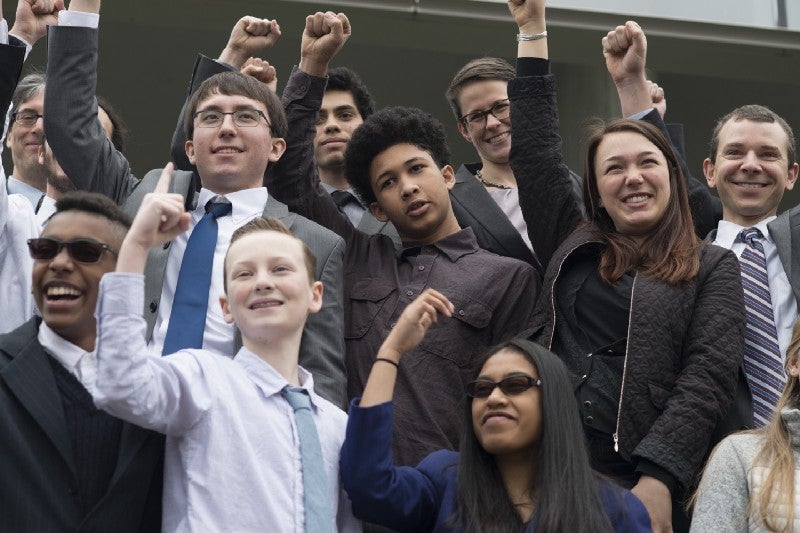
Our Children’s Trust, the nonprofit supporting the lawsuit, is bringing similar suits against Alaska, Colorado, Maine, Massachusetts, New Mexico, North Carolina, Oregon and, most recently, Washington. Earlier this year, 13 young Washingtonians, including Zero Hour founder Jamie Margolin, filed suit against the state for failing to address the carbon crisis. The youth lawsuits make broad claims about climate change and the role of government, and judges are taking them seriously.
“Exercising my ‘reasoned judgment,’ I have no doubt that the right to a climate system capable of sustaining human life is fundamental to a free and ordered society,” wrote US District Judge Ann Aiken in an opinion and order that cited Obergefell vs Hodges, the Supreme Court case legalizing same-sex marriage. “Just as marriage is the foundation of the family, a stable climate system is quite literally the foundation of society, without which there would be neither civilization nor progress.”
Climate denial is waning, but not fast enough.
The fact that young Americans are so worried about climate change offers some hope for the future. Children today will eventually grow up to replace their parents and grandparents, and the country will come around on climate. “It’s generational,” Bill Nye the Science Guy told the Los Angeles Times. “So we’re just going to have to wait for those people to ‘age out.’ ‘Age out’ is a euphemism for ‘die.’ But it’ll happen, I guarantee you—that’ll happen.”
The problem is that will almost certainly not happen fast enough. The Paris Agreement set out a goal of keeping warming to under 2 degrees celsius. At the current rate of emissions, humanity will blow past that target in around 20 years, giving way to storms, droughts, floods and heat waves unseen in the history of human civilization. Climate change demands nothing short of the total transformation of the global energy system in just a few short decades. There is no time left to spare.
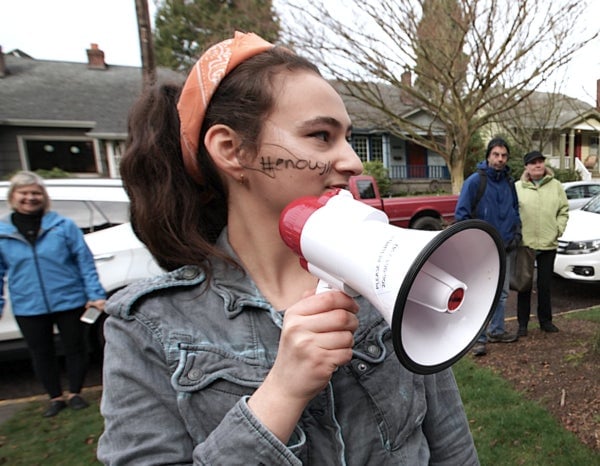
“Our movement is called Zero Hour to emphasize the sense of urgency my generation lives with every day,” Margolin wrote in an essay for Refinery29. “It was an emergency 30 years ago. It’s Zero Hour to act on climate change.”
The simple fact is that to keep climate change in check, young people must persuade their parents and grandparents of the gravity of the problem. And, more importantly, their parents and grandparents must take them seriously. They must pay attention to the anxieties and ambitions of young people—not out of obligation, but out of respect.
“We’re going to be growing up with this,” Artis said. “If we continue to pollute the Earth, then there is no livable future for anyone.”
This post originally appeared on Nexus Media.